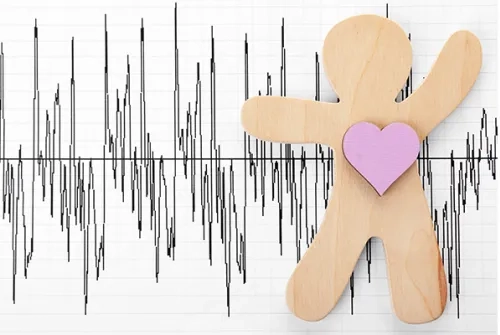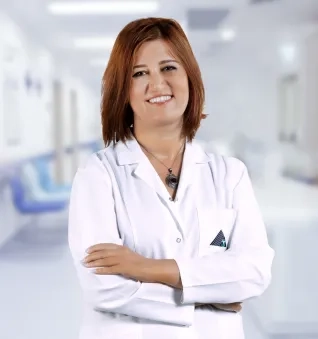Alo Yeditepe
Alo Yeditepe
Palpitations in Children
If palpitations in children start and end suddenly, it may indicate a rhythm disorder
What is thought to be an issue commonly seen in adults, palpitations, is also encountered during childhood. Associate Professor, a specialist in Pediatric Cardiology, stated that although palpitations can occur throughout childhood, it is more frequent in children over the age of five who are more aware, especially during the school age and exam stress. Emphasizing that palpitations can indicate both exam stress and more serious underlying problems, Dr. Pamukçu highlighted the importance of seeking medical attention without delay, especially when complaints such as sudden onset and cessation, accompanied by nausea, dizziness, darkening of vision, chest pain, and weakness are observed.
Feeling the child's heart rate as faster, pronounced, or irregular than what is expected for their age is defined as palpitations, and it is crucial to identify the underlying cause. Associate Professor a specialist in Pediatric Cardiology at Yeditepe University Hospitals, explained that although the way a child expresses themselves may vary according to their age group, they describe their experience as follows: "For example, a child in the play age might express palpitations as 'there is a bird in my heart,' while a school-age child may say 'my heart was about to jump out of my mouth' or 'I felt like I was very scared.' A teenager in adolescence might say that their heart beats faster and irregularly than normal."
Attention to Sudden Onset Palpitations in Children!
"Our Pediatric Cardiology expert, emphasizing that if palpitations in children start and end suddenly, accompanied by complaints such as nausea, dizziness, darkening of vision, chest pain, weakness, and fainting, it should be remembered that there may be a serious rhythm disorder in the patient," continued her statement as follows: "Fainting in these patients during sleep, swimming, sudden/unexpected noises, or exercising is noteworthy. In individuals with a family history of sudden death before the age of 35, there is a high probability of a life-threatening rhythm disorder."
Our Pediatric Cardiology expert, noting that complaints in school-age children increase after the age of five, when children are more aware, and with exam stress, also mentioned that the condition experienced by children may not always indicate a heart disease. She explained, "Anxiety, stress, anger, excitement, sadness, and feeling our heartbeats more during feverish conditions or exercise can be considered physiological or normal. Apart from these situations, if a child says that their heart beats faster, stronger, or irregularly than normal, we recommend consulting a pediatric cardiologist."
What Conditions Cause Palpitations in Children?
Palpitations can occur in conditions other than heart disease, such as fever-related infections, anemia-related issues, and those associated with the overactivity of the thyroid gland. Additionally, our expert pointed out that asthma, hypertension, influenza, depression, and some antiarrhythmic medications can also contribute to palpitations. She provided the following information: "Certain foods and beverages with high caffeine content, such as tea, coffee, chocolate, cola, and energy drinks, can trigger palpitations. Fever and anemia are significant factors that can increase palpitations. Moreover, excessive anxiety in children can also exacerbate palpitations. In such cases, seeking psychological support can be beneficial."
How is Palpitation Diagnosis Established in Children?
Our expert, emphasizing that for every child presenting with palpitations, an electrocardiogram (EKG) should be performed initially to examine the heart rhythm, continued her statement as follows: "However, in most cases, when patients come to the hospital, the palpitations have already ceased, so the EKG is often found to be normal. In such cases, the family is educated on counting the pulse at home during palpitations. Pulse counting can be done at home using smartwatches or blood pressure monitors, but these smart devices may not detect irregularities in the pulse and may provide inaccurate results by not counting irregular beats. The ideal scenario is for the child, if capable, to count their own pulse; otherwise, the family should both count the child's pulse and monitor its regularity during an episode. Additionally, based on the child's complaints, some advanced tests may be planned."
What to Do During Palpitations?
Our expert, explaining that during a palpitation attack, the family should calm the child and encourage deep breathing, provided the following information on what should be done: "Reflexes such as straining, deep breathing, and coughing can terminate palpitations. Additionally, washing the face with icy water or applying cold to the face can slow down the heart rate. However, if the palpitation complaint persists, the patient should be taken to the nearest healthcare facility, and an EKG should be performed as soon as possible upon arrival. It should be remembered that some rhythm disorders causing fainting can result in sudden loss of life. Therefore, children with palpitation complaints should be evaluated by a Pediatric Cardiologist."
Our expert mentioned that depending on the type of palpitation, some patients may be observed without medication, while others may require the initiation of single or multiple antiarrhythmic drugs. She added, "In addition, for some rhythm disorders causing palpitations in children, non-surgical treatment methods such as catheterization of the heart and electrophysiological study with methods like hot or cold burning during the procedure can be used for definitive treatment."
In cases of pediatric palpitations, medical check-ups should not be neglected!
Yeditepe University Hospitals Pediatric Cardiology Specialist Assoc. emphasizes the importance of regular medical check-ups for these children, stating, "In addition, it is crucial for them to maintain a healthy diet, avoid caffeine-containing foods and beverages, steer clear of medications that may trigger palpitations, and consult their doctor when necessary. Before participating in sports, they should always seek the opinion of their cardiologist."
This content was prepared by Yeditepe University Hospitals Medical Editorial Board.
”
See Also
- What is Whooping Cough? The Importance of Whooping Cough Vaccination During Pregnancy
- Is Swallowing Cat Hair Dangerous?
- What is Molluscum Contagiosum? What are the Symptoms?
- Which Vaccine Should be Given in Adolescence and When?
- Precautions to Take Protecting Children from Infections
- What is Predisposition to Allergy (Atopy)?
- Hand Foot and Mouth Disease Symptoms and Prevention Methods
- What is Measles? Symptoms and Treatment
- Allergies in Children Can Increase During the Summer Months
- Flu Vaccination in Children
- Benefits of Breast Milk and Breastfeeding
- Congenital CMV Infection in the Neonatal Period
- When do Babies Start Walking?
- When do Babies Start Talking?
- What Diseases Can Insomnia Cause in Children?
- What is the Goal in Newborn Intensive Care Treatment?
- How to Choose Baby Clothes?
- Is the Incidence of Reflux Increasing Among Children?
- If Your Child is Constantly Getting Sick in the Winter, It Could be Due to Allergies
- Vaccine Rejection Can Lead to Irreversible Problems!
- Children Whose Parents Are Allergic Are More At Risk
- Pay Attention to the Children Who Get Sick Often
- Allergic Disease Rates Increased from 3% to 15% in the Last 20 Years
- High Fever in Children Article Series I
- Genetics is the Key Cause of Food Allergies in Children
- Pay Attention to Food Allergies in Children!
- Complementary Foods for Babies
- Points to Be Considered in Baby Clothing
- What and How Much Should Children Eat at Which Time of Meal?
- What is the Right Lunch Box for Children?
- Protecting Children from COVID-19
- Infection Can Cause the Onset of Asthma Disease
Alo Yeditepe









